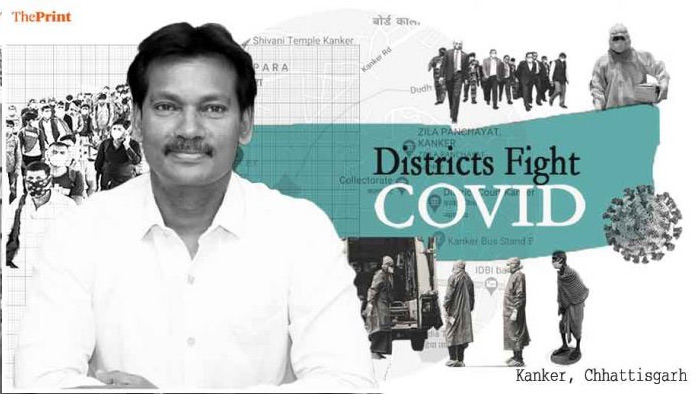District Collector of Uttar Bastar Kanker, Chhattisgarh, writes about his admin’s humanitarian approach in providing support at the grassroots level during Covid.

Kumar Lal Chouhan, District Collector of Uttar Bastar Kanker in Chhattisgarh | Illustration by ThePrint Team
The Covid-19 pandemic has tested the bureaucracy in providing essential goods and services in a smooth manner, despite the lockdown restrictions in place. In this regard, the administration of North Bastar Kanker, Chhattisgarh — a severely LWE affected district of the Bastar Region — has done amazing work under the guidance of Collector Kumar Lal Chouhan.
As soon as the lockdown was declared on 24 March, officials from various departments in North Bastar Kanker were delegated responsibilities to monitor the implementation of rules and follow important guidelines, both for public and the departmental staff. Daily meetings with line departments were conducted and Covid safety guidelines of social distancing, wearing masks, using hand wash and sanitisers etc. were diligently followed. This helped immensely in updating our plans as per changing situations on the ground.
Battling limitations, making entrepreneurs
Due to the lockdown, logistics, essentials goods and services were bound to be an issue. However, by proactively identifying the problem areas, and meeting with relevant stakeholders, things were managed without any glitch. There has been no lack of supplies in North Bastar Kanker to date. Additionally, to prevent people from going out, home delivery of essential goods was also promoted. The administration supported Self-Help Group (SHG) women, and encouraged them to take orders for vegetables and other supplies, and deliver them using E-rickshaws received under the National Rural Livelihood Mission.
Supplementing this, the North Bastar Kanker administration also supported young entrepreneurs and the launch of delivery platform jaivikcart, which delivers fruits, vegetables and other essentials.
The administration has remained committed towards providing additional sources of income during Covid-19 to rural women. SHGs were motivated to stitch reusable cloth mask, and it was made mandatory for district officials and staff to use masks purchased from SHGs. In addition, the beneficiaries who collected non-timber forest products (NTFPs) such as Tendu Patta were also supplied with masks by SHGs in convergence with the Forest Department. More than 1.5 lakh masks have been made in North Bastar Kanker district till now, contributing to more than Rs 12 lakh of income to SHG women.
Coming together of various departments
Preventing rumours about Covid-19 and avoiding spread of panic was another priority of the administration. Intensive work on Information, Extension and Communication (IEC) was done, including distribution of pamphlets, announcements through loudspeakers, and making short informative videos that were shared on social media platforms.
People who were being kept in home isolation were counselled frequently by the staff of Health & Family Welfare Department. Multiple quarantine centres were set up in gram panchayats, and officials were appointed to monitor and ensure facilities for residents.
A rapid response team was also formed, which comprised officials from various line departments such as police, health, education, revenue and women & child development, among others. The team mostly had young officials and consultants working round-the-clock to address and resolve people’s issues.
A 100-bed Covid hospital was made functional in North Bastar Kanker with all necessary equipment to enable treatment of patients. Apart from sending timely test samples to the appointed location, a control room was also set up with officials from health, education and WCD departments to track cases, and facilitate convergence between multiple departments to mobilise the teams.
The control room also served as the ‘think tank’ for coronavirus cases — finding trends and identifying hotspots in North Bastar Kanker, while planning the course of action. Auxiliary nurse midwives (ANMs), Anganwadi workers (AWWs), and other line workers were mobilised to identify those in potential contact with Covid-infected patients. This has helped the administration focus on hotspots, and prevent further contact with the patients, which kept the positive cases limited to quarantine centres.
Looking after the needy
To facilitate travel, food and lodging for migrating labourers, more than 35 relief camps were established across North Bastar Kanker district. Dry ration kits are being distributed with help from people who donated funds for the purpose. NGOs and civil service organisations were involved in this drive. These organisations are also helping in identifying impoverished families, who may need support due to lack of income during the lockdown.
Maxim Hemonic, a French citizen who was stuck in North Bastar Kanker for almost a month due to the Covid lockdown, was able to return to France, thanks to the support provided by the district administration. Hemonic expressed gratitude to the administration for helping him during his stay, as well as for making travel arrangements for him.
The Covid-19 pandemic has indeed disrupted people’s lives, and has been one of the most difficult situation for citizens as well as the administration. But the crisis has pushed citizens of North Bastar Kanker to innovate in their businesses. Also, the labourers who lived in metro cities have returned, thereby increasing the workforce. Apart from MGNREGS, the administration has engaged them by planning specific skill development programs, after identifying workforce requirements in the district. This includes jobs like AC repair, heavy machinery mechanic, hospitality, fabrication etc.
Additionally, farmers across the district are being organized into farmer- producer organisations, so that they can get better price for their produce. The administration has also started allotting space to entrepreneurs in the newly constructed Food Park, which is dedicated for the value processing of fruits (such as custard apple), vegetables and Non Forest Timber Produce (NFTP) produced in the district.
There is a need for a more humanitarian approach to provide maximum benefit at the grassroots level, and North Bastar Kanker district administration remains devoted to this cause.
Source: The Print

